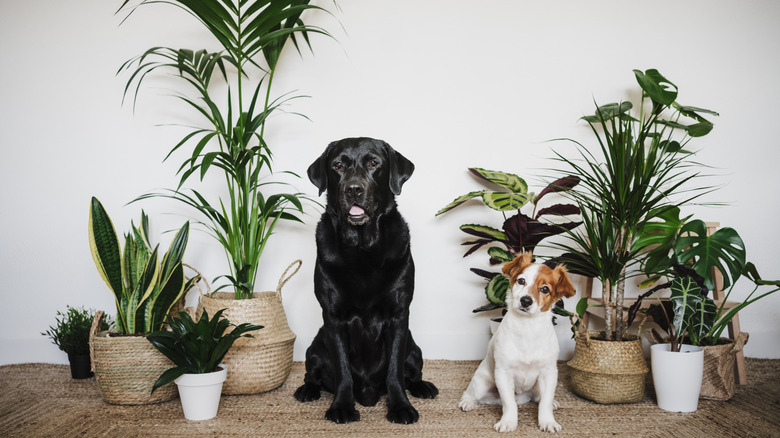The Succulent That's Dangerous For Any Dog Owner To Have In Their Home
Succulents can make great house plants because they're low-maintenance, hard to kill, and pleasing to the eye. Some species can even provide detoxification benefits, but there's one you shouldn't keep in your home if you have dogs: calandiva, a hybrid of the kalanchoe plant. Known for its roselike, colorful flowers, calandiva contains a chemical compound that's toxic to dogs (and cats) if ingested, with the ability to affect their heart and central nervous system.
Although canines don't typically munch on greenery like they do on their rawhide bones, some dogs may eat plants out of boredom or in an attempt to soothe an upset stomach, unaware of the dangers. A new plant can increase the likelihood that your canine companion will want to take a nibble, fueled by sheer curiosity. If you have a puppy, you can expect a more exploratory nature and greater desire to chew on new things.
The easiest way to keep your dog safe from this toxic plant is by not bringing it inside your home at all. Consider dog-friendly flowers and succulents instead, such as Chinese money plant or bunny ear cactus. If you already have calandiva, however, you don't necessarily have to get rid of it. Instead, you may opt to move it somewhere your dog can't access, like a high shelf or in a room you keep closed when leaving them home alone.
What happens if a dog eats calandiva?
If you recently brought home a calandiva plant, or if you've had several in your home for a while, it's natural to be concerned about the "what ifs." What if my dog were to eat some of my calandiva plant? How would I know? What would happen to them? Even if you have 100% confidence that your pup would never nibble on your greenery, it's still wise to know the symptoms of calandiva poisoning.
Ingesting even a small amount of calandiva -– flowers, stems, leaves, or roots -– is enough to make a dog sick. Per Wag!, visible signs of poisoning include excessive salivation, diarrhea, vomiting, dilated pupils, and seizures, among others. Other potential symptoms that you won't be able to see are an abnormal heart rate, cardiac arrhythmias, and a decreased or increased heart rate. If your dog consumes a large amount of calandiva, the results could be fatal if you don't seek treatment immediately.
Call your veterinarian or an emergency veterinary facility if your canine swallows any calandiva. Treatment options include stomach pumping, giving the dog activated charcoal to absorb the toxins, and medication, among others. The sooner your pup receives professional care, the greater their chances of recovery and survival.

